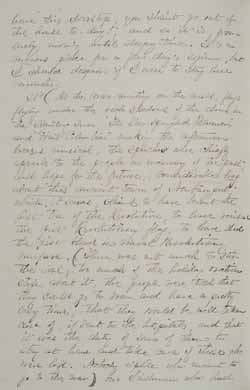Collections Online
Lucy Larcom diary, 1862-1863, pages with entries for 21-23 August 1862
To order an image, navigate to the full
display and click "request this image"
on the blue toolbar.
-
Choose an alternate description of this item written for these projects:
- Main description
[ This description is from the project: Civil War ]
In her journal, Lucy Larcom, a poet, editor, and educator, often reflected on the causes and potential consequences of the Civil War. Writing on 21 August 1862, Larcom noted her thoughts after attending a war rally held in Newburyport, Massachusetts, and expressed concern about the impending draft and the emergence of the bounty system as a means of recruiting volunteer soldiers. Two days later, she wrote of viewing the Swift-Tuttle comet —“this strange freak of the sky”— and shared her thoughts on current news about emancipation and Union Army leadership.
Lucy Larcom was born on 5 March 1824 in Beverly, Massachusetts, the second youngest of the ten children of Benjamin Larcom, a shipmaster and shopkeeper, and Lois Barrett Larcom. Benjamin died when Lucy was seven and, three years later, her mother moved the family to Lowell, Massachusetts, where she became a supervisor in one of the boarding houses established by the textile mills and the Larcom sisters worked in the mills to support the family. While working in the Lowell mills, Lucy, a voracious reader, attended public school part-time. She had a lifelong love of poetry and as a young woman began writing poems, often involving themes of morality and religion. In 1858, her poem “Hannah Binding Shoes” brought her national fame and caught the attention of poet and abolitionist John Greenleaf Whittier who encouraged her to continue writing. Larcom began corresponding with Whittier and developed a close friendship which lasted over 50 years.
In her diary entry for 21 August, Larcom revealed her disappointment in the rhetoric of the various speakers at the war rally who offered insufficient abstract slogans in order to encourage men to join the Union army. “Give us some great, eternal principle to make our country seem worth fighting for and men and women will return to their first enthusiasm,” Larcom wrote, suggesting that a greater rallying cry for raising troops should stress that the liberty of every American was at stake.
Lucy Larcom passionately supported the Union cause and wrote numerous well-regarded poems and verses about the war. She also believed in the principles of abolitionism and emancipation. Just one week before attending the war rally in Newburyport, Lucy enjoyed a lunch with the famed abolitionist Harriet Beecher Stowe, one of her most admired writers. After the rally made her lament that “the release of our brethren from bondage” was merely “one of the ‘side-issues,’” on 23 August she wrote of “newspaper talk” that President Lincoln would soon issue an order emancipating the slaves, which would have been commendable if not for the rumor that the slaves “are to be colonized in Central America.”
On President Lincoln’s 2 July call for 300,000 new volunteers, Larcom wrote satirically concerning able bodied men who, when the subject of a potential draft was mentioned, were suddenly seized with many varieties of ailments or abruptly decided they would change their vocation and go “a-fishing” as mariners were exempt from the draft. At the time, Massachusetts was expected to contribute 15,000 men with the town of Newburyport’s share being 179 men. She also noted that the new army was being raised primarily by means of bounties, or monies that various cities and towns offered to soldiers as an incentive to volunteer for military service.
After the war, Lucy Larcom became an editor of Our Young Folks, a magazine specifically for young teens. In 1889, she wrote the critically acclaimed book A New England Girlhood in which her describes her love for her native town of Beverly, noting that “there is something in the place where we were born that holds us by the heart strings,” and discusses her experience as a worker in the Lowell mills. Lucy Larcom died of heart disease on 17 April 1893 and was buried in her beloved Beverly.
Sources for Further Reading
The featured document is an excerpt from the Lucy Larcom diaries, 1862-1893. This collection includes two diary volumes covering 20 August 1862 to 10 February 1863 and 28 November 1881 to 20 February 1893. In addition to capturing her thoughts on the Civil War in volume one, the entries reflect Larcom’s views on her own life and health, faith, nature, music, and contemporary issues.
Hallett, William. Newburyport and the Civil War. Charleston, SC: History Press, 2012.
Larcom, Lucy. A New England Girlhood: Outlined from Memory. Boston: Houghton Mifflin, 1889.
Larcom, Lucy. Poems. Boston: Fields, Osgood & Co., 1869.

